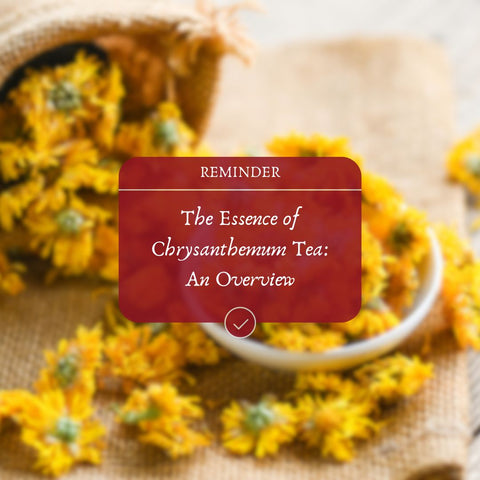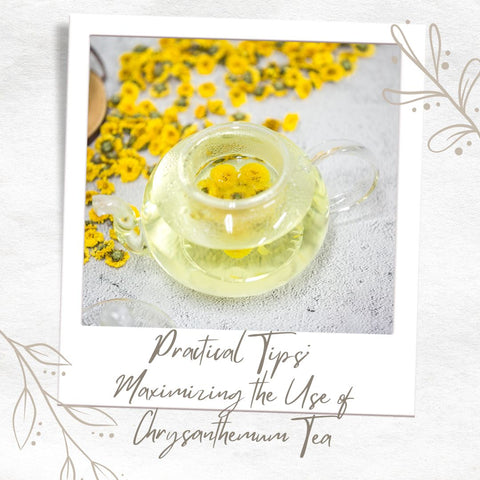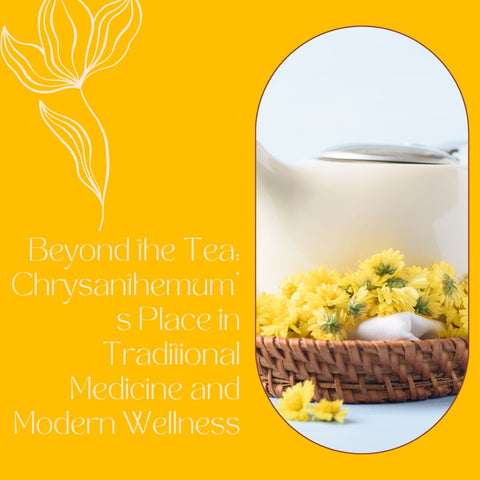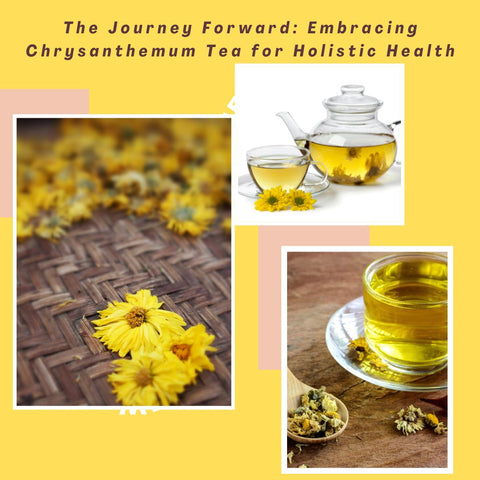Chrysanthemum tea has been used for centuries in traditional Chinese medicine due to its potential health benefits and pleasant flavour. This blog provides a comprehensive overview of the benefits, uses, and precautions of chrysanthemum tea.
The Essence of Chrysanthemum Tea: An Overview

Chrysanthemum tea is a traditional herbal beverage made from dried flowers of the chrysanthemum plant, also known as Chrysanthemum morifolium. This aromatic tea from China has been enjoyed for centuries due to its delicate floral flavour and potential health benefits. This blog provides an overview of the essence of chrysanthemum tea.
Nutritional Breakdown: What's Inside Your Cup?
Chrysanthemum tea is a herbal infusion made from dried chrysanthemum flowers (specifically Chrysanthemum morifolium). While it is low in macronutrients like protein, fat, and carbohydrates, it does contain several vitamins, minerals, and antioxidants that may help with its health benefits. The nutritional breakdown of chrysanthemum tea includes vitamins, minerals, antioxidants, other compounds, calories, and macronutrients.
The Antioxidant Powerhouse: Exploring Chrysanthemum's Healthful Compounds
Chrysanthemum contains a variety of compounds that contribute to its antioxidant properties, making it a potential powerhouse in the promotion of health and wellness. Here are some of the beneficial compounds found in the chrysanthemum:
-
Chrysanthemum is high in flavonoids, a type of plant compound that has antioxidant and anti-inflammatory properties. Flavonoids like quercetin, luteolin, and apigenin are abundant in chrysanthemum and help neutralize harmful free radicals in the body, reducing oxidative stress and inflammation.
-
The carotenoids lutein and zeaxanthin, which are beneficial to eye health, are present in significant amounts in chrysanthemum. Lutein and zeaxanthin accumulate in the retina and help protect against age-related macular degeneration and other eye disorders by filtering harmful blue light and reducing oxidative stress.
-
Chlorogenic acid is a phenolic compound found in chrysanthemum that has antioxidant and antiinflammatory properties. It helps scavenge free radicals, reduces inflammation, and may aid in the prevention of chronic diseases like heart disease and diabetes.
-
Chrysanthemum contains mogrosides, which are the natural compounds responsible for its sweetness. Unlike sugar, mogrosides contain no calories or carbohydrates and have been investigated for potential health benefits such as antioxidant, anti-inflammatory, and antidiabetic properties.
-
Chrysanthemum essential oils are high in terpenes, sesquiterpenes, and esters, which contribute to its fragrant flavour and aroma. Some of these volatile compounds have antioxidant and antimicrobial properties, which contribute to the overall health benefits of chrysanthemum.
-
While chrysanthemum is not a high-quality source of vitamins and minerals, it does contain trace amounts of nutrients such as vitamin A, vitamin C, potassium, and calcium, all of which contribute to overall health and wellness.
Sipping on Health: The Multifaceted Benefits of Chrysanthemum Tea

Chrysanthemum tea provides numerous health benefits, making it more than just a tasty beverage. Here are the various benefits of incorporating chrysanthemum tea into your daily routine:
-
Antioxidant Powerhouse: Rich in flavonoids, lutein, zeaxanthin, and chlorogenic acid, chrysanthemum tea is a potent source of antioxidants that help fight oxidative stress and lower the risk of chronic illnesses like diabetes, cancer, and heart disease.
-
Promotes Eye Health: Chrysanthemum tea's lutein and zeaxanthin content is good for your eyes. These antioxidants work by blocking harmful blue light and minimising oxidative damage to the retina, protecting the eyes from age-related macular degeneration, cataracts, and other vision-related problems.
-
Anti-Inflammatory Properties: Flavonoids and chlorogenic acid, two substances found in chrysanthemum tea, have anti-inflammatory qualities. Regular chrysanthemum tea consumption may help reduce inflammation throughout the body, thereby alleviating symptoms of inflammatory conditions such as arthritis, asthma, and inflammatory bowel disease.
-
Calming and Relaxing: Chrysanthemum tea has a naturally calming effect on the body and mind, making it an ideal beverage for relieving stress and anxiety and promoting relaxation. It can help calm nerves, improve sleep, and relieve tension headaches.
-
Digestive Aid: Chrysanthemum tea, which has traditionally been used as a digestive tonic, can help promote healthy digestion while also relieving indigestion, bloating, and nausea. It may also benefit liver and gallbladder function by aiding in fat breakdown and digestion.
-
Skin Health: Chrysanthemum tea's antioxidant and anti-inflammatory properties may improve skin health by reducing oxidative damage, inflammation, and signs of ageing. Some people use chrysanthemum tea as a facial rinse or toner to achieve clear, radiant skin.
-
Hydration: Chrysanthemum tea is a hydrating beverage that can help replenish fluids and electrolytes in the body, especially when consumed hot or cold. Staying hydrated is essential for overall health and supports various bodily functions, including circulation, digestion, and temperature regulation.
-
Low in Calories and Caffeine-Free: Chrysanthemum tea is naturally low in calories and caffeine free, making it a healthier alternative to sugary and caffeinated beverages. It can be consumed throughout the day as a refreshing and hydrating beverage, without the jitters or crash caused by caffeine.
Cold and Flu Prevention: Chrysanthemum Tea to the Rescue
Due to its potential health benefits, chrysanthemum tea can be an important addition to your cold and flu prevention toolkit. Here's how it can benefit:
-
Chrysanthemum tea contains antioxidants such as vitamin C and flavonoids, which help to boost the immune system and protect the body from infections. Drinking chrysanthemum tea regularly may help your immune system fight off cold and flu viruses.
-
Chrysanthemum tea contains anti-inflammatory compounds such as flavonoids and chlorogenic acid, which can help reduce inflammation in the respiratory tract and alleviate cold and flu symptoms such as sore throat and congestion.
-
Chrysanthemum tea has a soothing effect on the respiratory system, making it useful for treating symptoms of respiratory infections such as coughing, chest congestion, and nasal congestion. Its mild, floral flavor can also help ease throat irritation and provide relief from coughing.
-
Staying hydrated is critical for supporting the immune system and overall health, particularly during the cold and flu season. Chrysanthemum tea is a hydrating beverage that can help replenish fluids lost through fever, sweating, or respiratory symptoms, keeping you hydrated and promoting recovery.
-
In traditional Chinese medicine, chrysanthemum tea is commonly used to reduce fever and cool the body's internal heat. It has a cooling effect on the body and may help reduce fevers caused by colds and flu.
-
Chrysanthemum tea has natural calming properties that can help promote relaxation, which is necessary for supporting the immune system and aiding in illness recovery. Drinking chrysanthemum tea before bedtime may enhance sleep quality and promote healing.
Vision Vitality: How Chrysanthemum Supports Eye Health
Chrysanthemum contains compounds that can improve eye health, making it an excellent addition to your wellness routine. Here's how chrysanthemum supports vision vitality: it's high in lutein and zeaxanthin, filters harmful light, promotes macular health, lowers the risk of cataracts, improves contrast sensitivity, and has anti-inflammatory properties.
Stress Relief and Relaxation: A Natural Solution
Chrysanthemum tea is well-known for its calming properties, making it an effective natural stress reliever and relaxant. Here's how chrysanthemum tea can promote a sense of calm and well-being:
-
Natural Sedative: Chrysanthemum tea contains compounds that act as natural sedatives, calming the nervous system and promoting relaxation. Drinking chrysanthemum tea before bedtime can promote restful sleep and help with insomnia or sleep disturbances caused by stress or anxiety.
-
Anxiolytic Effects: Compounds found in chrysanthemum tea, such as flavonoids and terpenoids, have anxiolytic (anti-anxiety) properties that can help alleviate tension, worry, and nervousness. Drinking chrysanthemum tea regularly may help manage anxiety symptoms and promote emotional wellbeing.
-
Stress Reduction: Chrysanthemum tea is adaptogenic, which means it helps the body adapt to stress and maintain balance. Drinking chrysanthemum tea during stressful situations can help reduce cortisol levels, the stress hormone, and promote a sense of calm and relaxation.
-
Muscle Relaxation: Chrysanthemum tea contains mild muscle relaxants that can help relieve tension headaches, muscle stiffness, and physical discomfort caused by stress. It may also help with menstrual cramps and other forms of muscle tension.
-
Calms the Mind: Chrysanthemum tea's soothing aroma and mild, floral flavour help to calm racing thoughts and promote mental clarity and focus. Taking a moment to savour a cup of chrysanthemum tea can provide a mindful pause in a hectic day, promoting relaxation and stress relief.
-
Promotes Digestive Health: Stress can impair digestive health, causing symptoms such as indigestion, bloating, and stomach discomfort. Chrysanthemum tea can help to soothe the digestive system, alleviate gastrointestinal symptoms, and improve overall digestive health.
-
Aids in Meditation and Mindfulness: Chrysanthemum tea can be combined with mindfulness practices like meditation, yoga, or deep breathing exercises to promote relaxation and a sense of inner calm and well-being. Its calming properties can aid in achieving a deeper level of relaxation and focus during meditation sessions.
Practical Tips: Maximizing the Use of Chrysanthemum Tea

Maximising the use of chrysanthemum tea entails incorporating it into your daily routine in innovative and practical ways to reap its full benefits. Some practical tips for getting the most out of your chrysanthemum tea include brewing properly, enhancing flavour, enjoying it hot or cold, incorporating it into cocktails, cooking, blending with other teas, topical use, and mindful moments. By following these simple guidelines, you will be able to get the most out of chrysanthemum tea and enjoy its delicious flavour, aroma, and health benefits in a variety of situations.
Brewing the Perfect Batch: Techniques and Tips
Brewing the ideal batch of chrysanthemum tea necessitates attention to detail and the proper techniques to extract its full flavour and benefits. Here's how to make chrysanthemum tea like a professional:
-
Select High-Quality Ingredients: Begin with high-quality dried chrysanthemum flowers for maximum flavour and aroma. Look for organic or pesticide-free options to ensure purity and freshness.
-
Ingredients: Add about 1-2 teaspoons of dried chrysanthemum flowers to each cup of water. Adjust the amount according to whether you prefer a stronger or milder brew.
-
Use Filtered Water: To make the best tea, use filtered or spring water that is free of impurities. Avoid using distilled water, as it may produce a flat-tasting brew.
-
Warm Up the Teapot or Cup: To preheat your teapot or cup, run hot water over it. This guarantees a constant flavour profile and aids in maintaining the water's temperature during brewing.
-
Steep at the Proper Temperature: Before making chrysanthemum tea, bring water to the proper temperature. The ideal temperature range for water is between 190 and 200°F (88 and 93°C). Boiling water can cause it to taste bitter.
-
When to Steep: To achieve the desired strength, steep the chrysanthemum flowers in hot water for a duration of 5 to 10 minutes. An even stronger and more flavorful brew is the product of longer steeping times.
-
Cover While Steeping: To ensure a fragrant and flavorful infusion, cover the teapot or cup while steeping to maintain heat and keep the aromatic oils from escaping.
-
Strain and Serve: After the tea has finished steeping, use a tea infuser or a fine-mesh strainer to remove the chrysanthemum flowers. Depending on your preference, pour the tea into cups and serve hot or over ice.
-
Sweeten to Taste: You can drink chrysanthemum tea unsweetened or with a little honey, sugar, or fruit juice added for extra sweetness. To taste, adjust the sweetness and savour!
-
Reuse Chrysanthemum Flowers: You can make several delicious batches of tea by steeping Chrysanthemum flowers several times. Experiment with re-steeping to discover your preferred flavor profile.
By using these techniques and tips, you can consistently brew the perfect batch of chrysanthemum tea, resulting in a delightful and aromatic beverage that calms the senses and promotes relaxation and well-being.
Creative Integrations: Incorporating Chrysanthemum Tea into Your Daily Routine
Incorporating chrysanthemum tea into your daily routine can be both pleasant and beneficial to your overall health. Morning rituals, afternoon pick-me-ups, pre-workout hydration, post-workout recovery, midday breaks, evening wind-downs, social gatherings, cooking and baking, skincare routines, and gift giving are all creative ways to incorporate chrysanthemum tea into your everyday life. By incorporating chrysanthemum tea into your daily routine in creative and practical ways, you can enjoy its delectable flavour while reaping numerous health benefits and improving your overall quality of life.
Choosing the Best: Navigating Between Chrysanthemum Tea Varieties
Choosing between different types of chrysanthemum tea can be a fun journey, with a variety of flavours, aromas, and health benefits. Here's how to select the best chrysanthemum tea based on your preferences, including cultivar, grade, processing method, flavour profile, aroma, health benefits, source, and packaging. Consider these factors and experiment with different types of chrysanthemum tea to find the best option for your taste preferences and wellness goals. Whether you prefer a delicate floral tea or a bold aromatic brew, there is a chrysanthemum tea variety to suit your taste.
Navigating the Cautionary Path: Understanding Potential Side Effects

While chrysanthemum tea offers numerous health benefits, it's essential to be aware of potential side effects and precautions, especially for certain individuals. Here's a guide to understanding potential side effects and navigating caution when consuming chrysanthemum tea:
-
Some individuals may be allergic to chrysanthemum flowers or other plants in the Asteraceae family, such as ragweed, daisies, or marigolds. If you have known allergies to these plants, exercise caution when consuming chrysanthemum tea and monitor for any allergic reactions, such as itching, hives, or swelling.
-
Pregnant or breastfeeding women should consult with their healthcare provider before consuming chrysanthemum tea. While moderate consumption is generally considered safe, excessive intake of certain compounds in chrysanthemum tea, such as caffeic acid derivatives, may pose risks during pregnancy or breastfeeding.
-
Chrysanthemum tea may interact with certain medications or drugs, including blood thinners, anticoagulants, and sedatives. If you are taking any medications or have underlying health conditions, consult with your healthcare provider before consuming chrysanthemum tea to avoid potential interactions or adverse effects.
-
In some cases, chrysanthemum tea may cause gastrointestinal upset or digestive discomfort, especially when consumed in large quantities or by individuals with sensitive stomachs. If you experience symptoms such as bloating, gas, or diarrhea after drinking chrysanthemum tea, consider reducing your intake or discontinuing consumption.
-
Chrysanthemum contains certain compounds that may increase photosensitivity in some individuals, making them more prone to sunburn or skin irritation when exposed to sunlight. If you notice any skin reactions or increased sensitivity to sunlight after consuming chrysanthemum tea, consider limiting your exposure to direct sunlight and using sun protection measures.
-
When purchasing chrysanthemum tea, opt for organic or pesticide-free options to minimize the risk of exposure to pesticide residues. Pesticide residues can have adverse health effects and may outweigh the potential benefits of consuming chrysanthemum tea.
-
Like any herbal remedy, moderation is key when consuming chrysanthemum tea. Avoid excessive consumption, especially if you are new to drinking chrysanthemum tea, to reduce the risk of potential side effects and adverse reactions.
-
Everyone's body reacts differently to herbal remedies, so pay attention to how your body responds to chrysanthemum tea. If you experience any unexpected or adverse effects after consuming chrysanthemum tea, discontinue use and consult with a healthcare professional.
Allergies and Sensitivities: Recognizing the Signs
Recognizing the symptoms of allergies and sensitivities to chrysanthemum tea is critical for your safety and well-being. Here are some common symptoms to be aware of:
-
Skin Reactions: Allergic reactions to chrysanthemum tea may cause itching, redness, hives, rash, or swelling. These symptoms can appear shortly after drinking chrysanthemum tea or coming into contact with chrysanthemum flowers.
-
Respiratory Symptoms: Chrysanthemum tea allergies can result in sneezing, runny or stuffy nose, nasal congestion, coughing, wheezing, or difficulty breathing. These symptoms may indicate allergic rhinitis or asthma caused by chrysanthemum exposure.
-
Gastrointestinal Distress: Allergic reactions or sensitivities to chrysanthemum tea can cause nausea, vomiting, stomach cramps, bloating, gas and diarrhoea. These symptoms could indicate an allergic reaction to certain compounds in chrysanthemum tea.
-
Oral Allergy Syndrome: Some individuals with pollen allergies may experience oral allergy syndrome (OAS) when consuming chrysanthemum tea. OAS causes itching, tingling, or swelling of the mouth, lips, tongue, or throat shortly after eating or drinking certain fruits, vegetables, or herbs, including chrysanthemum.
-
Anaphylaxis: In rare cases, severe allergic reactions to chrysanthemum tea can cause anaphylaxis, a potentially fatal allergic emergency. Anaphylaxis symptoms include difficulty breathing, rapid heartbeat, low blood pressure, loss of consciousness, and swelling of the face, throat, or tongue. Anaphylaxis necessitates immediate medical care and intervention.
When to Avoid: Precautions for Specific Health Conditions
While chrysanthemum tea has many health benefits, people with certain health conditions should exercise caution or avoid drinking it altogether. Precautions for specific health conditions include allergies, pregnancy and breastfeeding, liver disease, kidney disease, bleeding disorders, diabetes, photosensitivity, and caffeine sensitivity. If you have any underlying health conditions or are concerned about drinking chrysanthemum tea, you should consult your healthcare provider for personalised advice and recommendations. They can assess your risk factors and advise you on whether chrysanthemum tea is safe to consume based on your specific health requirements.
Consulting the Experts: When to Talk to Your Doctor
In certain circumstances, speaking with your physician is imperative when deciding whether or not to drink chrysanthemum tea. Here's when you ought to consult your physician:
-
If you have any underlying health conditions, such as liver disease, kidney disease, diabetes, bleeding disorders, or allergies, talk to your doctor before drinking chrysanthemum tea. Your doctor can tell you whether it is safe to drink chrysanthemum tea and if any precautions are required.
-
Pregnant or breastfeeding women should seek medical advice before drinking chrysanthemum tea. While moderate consumption is generally considered safe, excessive consumption may be harmful during pregnancy or breastfeeding. Your doctor can make personalised recommendations based on your health status.
-
If you are taking any medications or supplements, especially blood thinners, anticoagulants, sedatives, or diabetes medications, check with your doctor before drinking chrysanthemum tea. Chrysanthemum tea may interact with certain medications, reducing their efficacy or causing side effects.
-
If you are allergic to chrysanthemum flowers or other Asteraceae plants such as ragweed, daisies, or marigolds, talk to your doctor before drinking chrysanthemum tea. Your doctor can assess your allergy risk and provide advice on how to manage it.
-
If you develop any unusual symptoms or adverse reactions after drinking chrysanthemum tea, such as skin rashes, difficulty breathing, digestive upset, or blood sugar changes, seek medical attention right away. Your doctor can help you identify the source of your symptoms and provide appropriate treatment.
-
If you are unsure whether chrysanthemum tea is right for you based on your overall health, consult with your doctor. They can look at your medical history, current health status, and any potential risk factors to determine whether chrysanthemum tea is safe for you to drink.
-
If you intend to drink chrysanthemum tea on a regular or long-term basis, consult your doctor first. Long-term use of herbal remedies may have health consequences, and your doctor can advise you on how to consume them safely and appropriately.
Beyond the Tea: Chrysanthemum's Place in Traditional Medicine and Modern Wellness

Chrysanthemum has a long history in traditional medicine and still plays an important role in modern wellness practices. Beyond tea, chrysanthemum is used in both traditional and contemporary contexts, including traditional Chinese medicine (TCM), herbal formulations, skin care, aromatherapy, traditional remedies, culinary uses, and modern wellness products. Individuals can harness the therapeutic properties of chrysanthemum by exploring its diverse applications in traditional medicine and modern wellness. Whether consumed as a soothing tea, incorporated into skincare routines, or used in aromatherapy, chrysanthemum continues to inspire and uplift the body and spirit.
A Historical Perspective: Chrysanthemum Tea in Traditional Healing
Chrysanthemum tea has a long and distinguished history in traditional healing practices, especially in Chinese medicine, where it is highly valued for its medicinal properties and therapeutic benefits. Here's some historical context for how chrysanthemum tea was used in traditional healing:
-
Chrysanthemum has been cultivated in China for over 2,000 years, and it has long been valued for its health-promoting properties. The cooling herb chrysanthemum is categorised as having both bitter and sweet flavours in traditional Chinese medicine (TCM). It is connected to the Lung and Liver meridians as well as the Metal element.
-
Chrysanthemum tea is traditionally used in Traditional Chinese Medicine (TCM) to treat fever, and inflammation, and to remove heat from the body. It is frequently prescribed for conditions such as fevers, sore throats, headaches, inflammation, and skin eruptions caused by the body's excessive heat production.
-
Chrysanthemum is used to soothe the liver, relieve liver congestion, and enhance liver function. It is thought to be good for liver health in Traditional Chinese Medicine. It is often recommended for individuals with liver imbalances or conditions such as liver heat, liver fire, or liver stagnation.
-
TCM has long used chrysanthemum to support and enhance eye health and vision. It is thought to hydrate the eyes, lessen the strain on them, and ease symptoms like redness, dryness, and blurry vision. Regular consumption of chrysanthemum tea is frequently employed as a prophylactic against ocular disorders.
-
In Chinese culture, chrysanthemum is linked to both vitality and longevity. As a result, it is frequently used in herbal remedies and health tonics that aim to enhance both of these qualities. It is thought to improve vitality and longevity, strengthen the body's resistance, and strengthen the immune system.
Modern Applications: Chrysanthemum Tea in Contemporary Health and Wellness
Chrysanthemum tea has a variety of modern applications in health and wellness, including a delicious and refreshing beverage that promotes relaxation, vitality, and overall well-being. In today's fast-paced world, chrysanthemum tea remains popular for its delightful flavour and numerous health benefits, whether consumed hot or cold.
The Journey Forward: Embracing Chrysanthemum Tea for Holistic Health

Embracing chrysanthemum tea for holistic health entails incorporating it into your daily routine as part of a healthy lifestyle that promotes physical, mental, and emotional well-being. Here are some ways you can incorporate chrysanthemum tea into your holistic health regimen, including mindful consumption, balanced nutrition, hydration, stress management, physical activity, skincare rituals, eye health, community and connection, self-care rituals, and a holistic approach. By embracing chrysanthemum tea for holistic health and incorporating it into your daily life with intention and mindfulness, you can improve your overall well-being and cultivate a stronger sense of balance, vitality, and harmony in mind, body, and spirit.
















